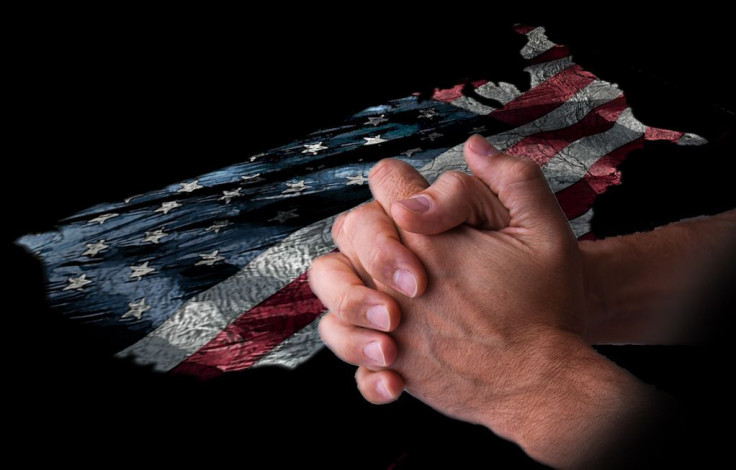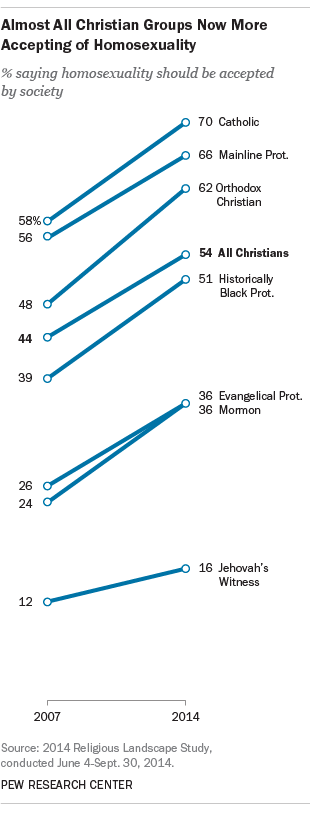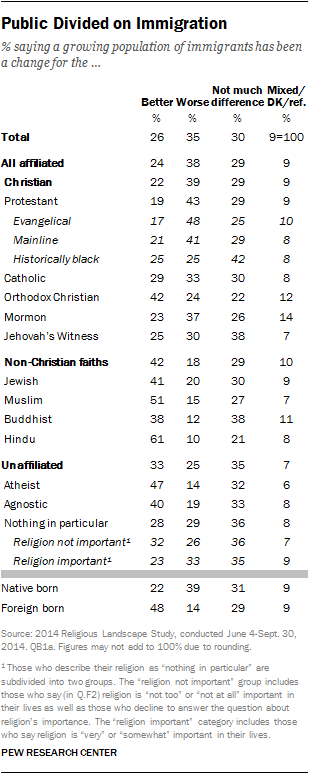Christianity And LGBT Rights: 70% Of US Catholics Say Gays Should Be Accepted By Society, According To Pew Study

American Christians have become a lot more tolerant of homosexuality over the past eight years, according to a landmark study released by the Pew Research Center on Tuesday that showed big gains in acceptance since the last time the study was conducted in 2007. The 2014 Religious Landscape Study, a survey of more than 35,000 Americans, examined a vast array of religious and social issues, including immigration.
The study concluded that nearly all major religious groups have become significantly more accepting of homosexuality -- and almost all Christian groups are more accepting than they were in 2007. It holds true even for evangelical Protestants and Mormons, who have traditionally strongly opposed same-sex relationships.
Overall, 54 percent of all self-described Christians said homosexuality should be accepted by society -- up from 44 percent in 2007. Among Catholics, the percentage jumped from 58 percent in 2007 to 70 percent in 2014. And 36 percent of evangelicals (of all races) and Mormons called for more acceptance, up from 26 percent and 24 percent, respectively. Among members of historically black Protestant churches, the acceptance rate jumped from 39 percent in 2007 to 51 percent in 2014.
“Despite attempts to paint religious people as monolithically opposed to LGBT rights, that’s just not the case, and these numbers prove that,” Jay Brown, head of research and education at the gay rights organization Human Rights Campaign Foundation, told the Religion News Service.

But people who were religiously unaffiliated still expressed the most acceptance for gays and lesbians, with a rate of 83 percent.
The study also examined American attitudes toward immigration. American Muslims and Hindus expressed the most positive feelings: 51 percent of Muslims and 61 percent of Hindus said the growing number of immigrants in the United States is a change for the better. Only 15 percent of Muslims and 10 percent of Hindus -- both groups that are composed heavily of immigrants themselves -- said an increase in immigration was a change for the worse in the United States.
Other religious groups were not as positive. Overall, just 22 percent of all Christians surveyed said more immigration is a change for the better, while 39 percent said it was a change for the worse. Among all Christian groups, evangelical Protestants were the most likely to view increased immigration negatively, with 48 percent saying it was a change for the worse and just 17 percent saying it was a change for the better. Those who were religiously unaffiliated had slightly more positive views. Atheists and agnostics both felt increased immigration had a positive effect on society, at 47 percent and 40 percent respectively.

Evolution was another hot-button issue Pew researchers surveyed. Overall, 62 percent of Americans surveyed said they believed that humans have evolved over time, while 34 percent said humans have always existed in their present form. But among those who believe in human evolution, there was disagreement over whether evolution was strictly a natural process or one guided by a supreme being. A third of all Americans said evolution stemmed from a natural process, while a quarter of Americans believed that it was guided by a supreme being.
Among religious groups, Jewish and Buddhist Americans were most likely to believe in some form of evolution, with 81 percent of Jews and 86 percent of Buddhists. More than half of all Christians -- 53 percent -- believed in evolution, with Catholics leading the pack at 66 percent and Jehovah's Witnesses expressing the most reluctance, at 20 percent. But atheists and agnostics almost universally agreed upon evolution, at 95 percent and 96 percent, respectively.
Other key findings in the study included that overall, Americans are slightly less religious than they were in 2007, with belief in God dropping from 92 percent in 2007 to 89 percent in 2014. The number of Americans who said they are “absolutely certain” God exists fell from 71 percent in 2007 to 63 percent in 2014. But those Americans who are religious (77 percent) are just as observant or more so today as they were in 2007.
“We should remember that the United States remains a nation of believers,” said Gregory A. Smith, Pew’s associate director of research, “with nearly 9 in 10 adults saying they believe in God.”
© Copyright IBTimes 2024. All rights reserved.





















